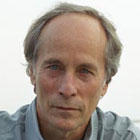My earliest reading memory
My reading begins with the long period when I didn’t read books at all. I could read, but I was undiagnosed dyslexic and didn’t, because it was frustrating and often humiliating to be so slow. Eventually, by age 18, I became possessed by a glum sensation: “Is this really all there is?” Reading literature – at whatever snail’s pace I managed – suggested there was actually more out there for me than I’d known.
My favourite book growing up
The World Book Encyclopedia. My parents bought this for me when I was eight and doing dismally in school, one red-leatherette volume for each gold-embossed letter of the alphabet. Polio, the Boer war, Abraham Lincoln, basketball: entries were short, informative and often happily had photographs.
The book that changed me as a teenager
Ernest Hemingway’s In Our Time story collection – when I was 19. These were short and deceptively easy to read. I liked the familiar Upper Michigan settings. And it impressed me that Nobel prize literature could have such ordinary locales and premises – a doctor taking his young son in a canoe across a forested lake to attend to an Indian woman enduring a dangerous pregnancy. This all surprised me and seemed relevant to life. Now, they seem to skimp on language and to oversimplify dense human experience.
The writer who changed by mind
William Faulkner – in particular his novel Absalom, Absalom! It took me for ever to read this novel because it was so full of words. But I understood from it that readers read first in order to be treated to well-chosen language; not for plot or character or – God help us – for theme.
The book that made me want to be a writer
Not a book but a short story. Frank O’Connor’s luminous Irish civil war story, Guests of the Nation, the last sentence of which is: “And anything that ever happened to me afterwards, I never felt the same about again.” I immediately wanted to put that line at the end of anything I could write.
The book I came back to
Anton Chekhov’s stories. I read The Lady With the Dog when I was 18, but was too young to understand what happened, since nothing much seemed to be happening. But its promise was that big things are often happening when they don’t appear to be. The story asks us to concede that and to pay closer attention to life.
The book I reread
The Waste Land by TS Eliot. I later heard the Caedmon recordings of Eliot reading this poem and realised he was just talking to me about everyday life, and wasn’t dressed in a mitre and clerical robes, quoting scripture from a pulpit – as I’d been taught in university.
The book I could never read again
Gravity’s Rainbow by Thomas Pynchon. For everything there’s a season. My life’s season is too short now for all those particular words.
The book I discovered later in life
Mrs Dalloway. Virginia Woolf’s 1925 modernist tour de force, which I undertook cold, as a possible “text” for a graduate course I was teaching at Columbia University. There’s something for a writer to learn on every page; not least of which is Woolf’s intense dedication to making Clarissa Dalloway – by my measure, a rather prosaic SW1 society dame – a compelling vessel and personage for her postwar age. Woolf reminds me that literary characters are not people but instruments made of words, dazzled into virtual life in order to be made use of by the writer and reader.
The book I am currently reading
Philip Larkin’s Letters to Monica. Of course, I’ve been reading it for years, a letter or two each night before turning off the light. When I get to the end I start again.
My comfort read
I don’t read for comfort. Comfort I source elsewhere. I read only to learn something and to be delighted by it.
• Be Mine by Richard Ford is published by Bloomsbury. To support the Guardian and Observer, order your copy at guardianbokshop.com. Delivery charges may apply.











